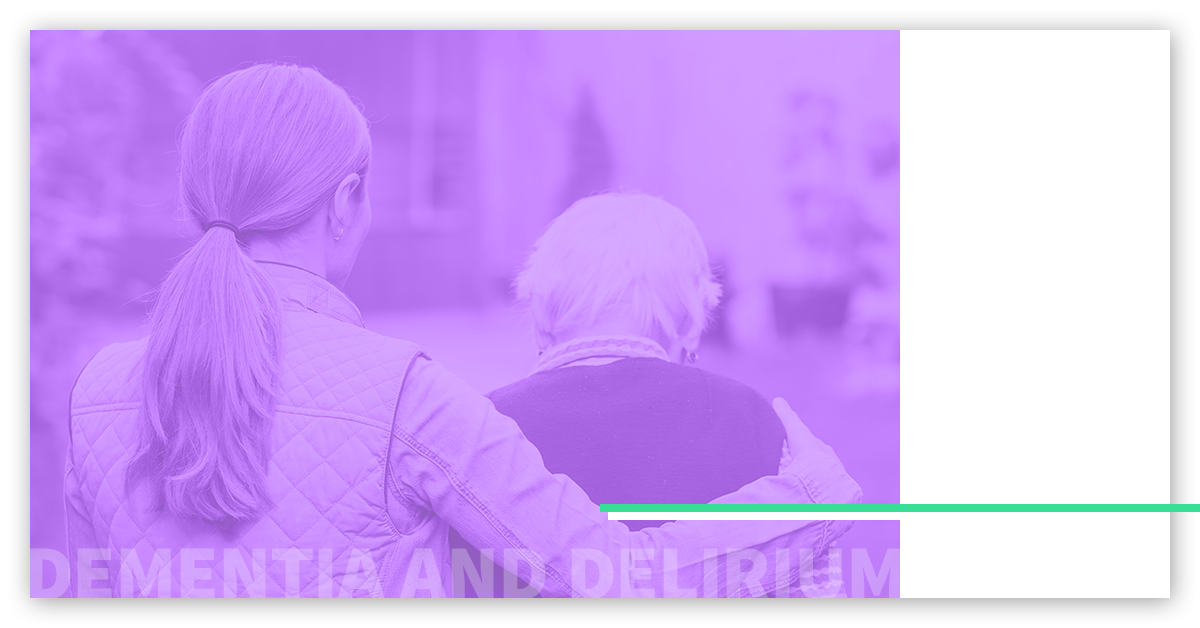Dementia and Delirium

LISTEN TO THIS ARTICLE:
Dementias are disorders of learning, memory, and information processing that follow a steady, progressive course of decline. Delirium is a temporary, and variable change in attention and awareness that occurs as a result of a medical condition.
What are the types of Dementias and Delirium?
Delirium is a problem with attention and awareness of surroundings that appears quickly over a few hours. Delirium varies in intensity and usually only lasts hours to days. It can come from an underlying medical condition (like pneumonia, liver disease, or other severe illness) or a reaction to a medication, or misuse of alcohol or drugs. Once the underlying cause has been identified and stabilized, delirium resolves.
In contrast, dementia is a progressive illness that is hard to recognize at first and slowly worsens over time. Dementia can have a wide variety of causes, though the most common type is Alzheimer’s dementia. Many different diseases can lead to various types of dementia, and the time it takes for changes to occur vary depending on the type. Some are due to physical injury to the brain, like vascular dementia (from multiple strokes) or traumatic brain injury. Infections like Human Immunodeficiency Virus (HIV) and prion-type diseases (commonly known as Mad Cow Disease) and neurological diseases like Huntington’s Disease and Parkinson’s Disease can also lead to dementia.
Cognitive domains
The concept of “cognitive domains” is crucial to understanding the difficulties that people encounter in dementias and delirium. These are six distinct areas of brain function. Problems in different parts of the brain correspond to various kinds of impairment.
- “Complex attention” includes the ability to selectively focus on certain things in the environment. It enables people to focus on more than one thing at a time and maintain attention for extended periods.
- “Executive function” covers high-level planning, organization, and decision making. This involves solving complex tasks and following directions. It also includes working memory, which requires retaining information for a short time.
- The “learning and memory” domain comprises everything from short term memory, like a shopping list, to long term memory, such as personal life history. Most people with different types of dementia will struggle mainly with short-term memory. However, they will retain memory of past events in their lives and skills like playing a musical instrument longer.
- “Language” is word finding, sentence structure, and understanding the natural give-and-take of conversation. It covers the ability to receive and understand what others are saying.
- “Perceptual-motor” abilities include basic visual skills, like recognizing faces, as well as tasks that require hand-eye coordination, like drawing and solving three dimensional puzzles.
- “Social cognition” is the ability to infer emotions from facial expressions and to understand general social cues. Theory of mind, the knowledge that other people will have different ideas, information, and perspectives than oneself, is also part of this domain.
Who gets Dementias and Delirium?
Delirium and physical illnesses
Delirium usually appears as a side effect of a wide variety of reasons someone would normally need to be in a hospital. Medications, severe illness, fever, anesthesia, and even significant pain can cause delirium.
Brain damage
When dementia symptoms occur at a younger age, they are often due to brain damage from an outside source. This can include physical trauma or infection, and in these cases, the syndrome is more likely to be referred to as a “Neurocognitive Disorder”.
Brain degeneration
The term “dementia” generally refers to symptoms from any of a variety of processes that slowly affect the brain over time. These most commonly affect older individuals.


 Learn
Learn Read Stories
Read Stories Get News
Get News Find Help
Find Help